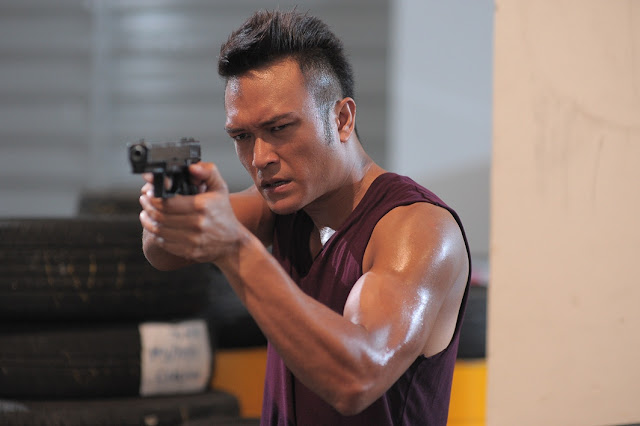 |
| The director ... Saw Teong Hin |
Football.
Fatherhood. Family … these elements will be found in the Malaysian made film
Jejak Warriors. The director of the film Saw Teong Hin spoke to theSun about
the challenges he faced in the film. The article was published today. Here is the full article
------------------------------------------------------------------------------------
Headline: On a Journey of Discovery
By Bissme S
Director Saw Teong Hin tackles the
theme of family and fatherhood played out in the world of the ‘greatest game on
earth’ in his latest film, Jejak Warriors, which will be released in cinemas
nationwide on Aug 27.
The film stars Mohd Aliff Firdaus, Pekin
Ibrahim, Nadiya Nissa, Harun Salim Bachik and Ogy Ahmad Daud. And playing a
major supporting role in this football film is Kelantan’s state team The Red
Warriors.Some of The Red Warriors key players who will be playing themselves in
the film include Khairul Fahmi Che Mat, Wan Zack Haikal Wan Nor, Mohd Fitri
Omar and Ahmad Fakri Saarani. Jejak Warriors centres on young teenager Wan Raja
(Mohd Aliff), who loses his father in an unfortunate accident. While going
through his father’s belongings, Wan Raja learn that he was a big fan of
Kelantan’s The Red Warriors. The team has a huge and loyal fanbase and has won
the Malaysia Cup in 2010.Hoping to honour his father’s spirit, Wan Raja decides
to travel from his home in Johor Baru to the city of Kota Baru to meet The Red
Warriors. Along the way, he encounters many adventures.
Helming the film is Saw, an industry
veteran with some 20 years of experience directing and producing not only films
but also advertisements and music videos. Saw made his feature film directorial
debut with Puteri Gunung Ledang, which was the first Malaysian film featured at
the Venice International Film Festival in 2004. He has also directed Apa Kata
Hati? (2008) and Hoore! Hoore! (2012).
In this
interview, Saw shares his thoughts on the local film industry and the
challenges he faced making Jejak Warriors.
*Tell us more about Jejak Warriors?
We rarely
make sports movies here. You do not have to be a sports fan to enjoy this film.
[Playing a] sport is an activity that inspires us to strive to be better and to
never give up. [All of us] are constantly striving to make our lives better.
Sometimes our plans work out successfully, and sometimes they fail. But when we
fail, we learn to pick up the pieces and continue with our struggle to make our
lives better.
*What was it
like directing the football players in Jejak Warriors.?
They are not
actors. They were nervous in front of the camera. They were afraid they [would
not know] where to stand and what kind of expressions to present for the camera. I had an acting coach (actress
Fauziah Nawi) to give them a few acting tips before filming.The good thing is
they are playing themselves. I just asked them to be natural. The only problem
was [their commitment to their football career]. I had to make sure our
shooting schedule fit around their matches.”
*Do you face
any challenges as a filmmaker in Malaysia?
Any
filmmaker who tells you that he/she is completely happy is lying. There are so
many constraints that we have to face as filmmakers in this country – from
censorship to financing the movies. You must learn to work around these, and
make the best of your situation. No one is spared the trails and
tribulations.As a filmmaker, I handle my problems
stoically
and cheerfully. You can easily focus on your problems but sometimes, that is
not going to help you. Frankly speaking, you must find joy in the things you
do.
* What are
some of your challenges?
The market
is dominated by certain genres of films and the producers want you to make
films that will appeal to the audience. When you want to make a film that is
out of the box, it is hard to get the funding. “I’m lucky that my next film
project is one that is close to my heart. I have always wanted to make a Penang
Hokkien film and the dream is slowly coming true. The film, You Mean the World
to Me, will start shooting in September. It is a family drama about love and
forgiveness. I wrote the script last year. But I could not find the funding for
it. So I presented it as a stage play last year and managed to secure some
financial backing for a movie.”
* What kind
relationship did you share with your own father?
My father
passed away in 2005. We were close. He was a businessman, a rice miller. But
his business failed. It was difficult for him and the family. But there was no
self-pity. He did not let his failure break him. He became a van driver to
support us. I did not grow up in a wealthy environment. But I was a happy
child. With him, I had experienced unconditional love.
---------------------------------------------------------------------------------
Scenes from Jejak Warriors



























